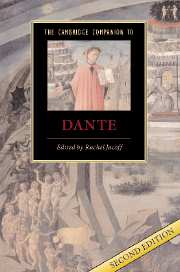Book contents
- Frontmatter
- 1 Life of Dante
- 2 Dante and the lyric past
- 3 Approaching the Vita nuova
- 4 From auctor to author: Dante before the Commedia
- 5 Introduction to Inferno
- 6 Introduction to Purgatorio
- 7 Introduction to Paradiso
- 8 Dante and the Bible
- 9 Dante and the classical poets
- 10 Allegory and autobiography
- 11 A poetics of chaos and harmony
- 12 The theology of the Comedy
- 13 The poetry and poetics of the creation
- 14 Dante and Florence
- 15 Dante and the empire
- 16 Dante and his commentators
- 17 Dante in English
- Further reading
- Index
- Series List
14 - Dante and Florence
Published online by Cambridge University Press: 28 May 2007
- Frontmatter
- 1 Life of Dante
- 2 Dante and the lyric past
- 3 Approaching the Vita nuova
- 4 From auctor to author: Dante before the Commedia
- 5 Introduction to Inferno
- 6 Introduction to Purgatorio
- 7 Introduction to Paradiso
- 8 Dante and the Bible
- 9 Dante and the classical poets
- 10 Allegory and autobiography
- 11 A poetics of chaos and harmony
- 12 The theology of the Comedy
- 13 The poetry and poetics of the creation
- 14 Dante and Florence
- 15 Dante and the empire
- 16 Dante and his commentators
- 17 Dante in English
- Further reading
- Index
- Series List
Summary
Dante's angry denunciation of Florence and the Florentines is one of the memorable themes of the Divina Commedia. Repeatedly in the great poem, and in several of his letters, Dante excoriated the Florentines for the violence, factionalism, and instability of their politics, for their excessive pursuit and consumption of wealth, and, worst of all, for their criminal resistance to what he considered the divinely ordained authority of the Roman emperor. Because we know so little of Dante's political views and opinions about Florence before his exile in 1302, it is tempting to use the fact of the exile and Dante's emotional reaction to it as a way of explaining his harsh critique of his own city. While there is no doubt much truth in such an approach, it is equally important to grasp the influence on Dante of the traditions of political and historical thought that emerged in Florence during the course of the thirteenth century, and in particular of the ideas associated with movements of popular opposition to the traditional dominance of the elite of upper-class families.
What little is known of Dante's political life before 1302 suggests that he played a role quite typical of those politically active Florentines who did not belong to the elite of economically powerful and influential families. The Alighieri were Guelfs, but by the 1290s Ghibellinism was a dead issue in Florence and everyone (or at least anyone who wanted any role in politics) was a Guelf. From about the mid-1290s, Dante held a number of important posts and was several times a member of the advisory boards convened by the government to give advice and support to its policies.
- Type
- Chapter
- Information
- The Cambridge Companion to Dante , pp. 236 - 256Publisher: Cambridge University PressPrint publication year: 2007
- 3
- Cited by

